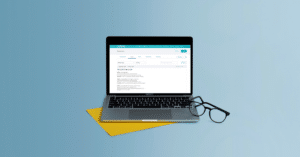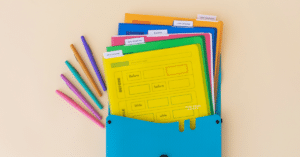Listen on Apple Podcasts Listen on Spotify
Welcome to another episode of The SLP Now Podcast, where we explore practical strategies and tactics for SLPs to enhance their skills and level up in their career. Today, we’re diving into a topic near and dear to our hearts:
Making the most of your next SLP conference
If you’ve been a podcast listener for a while, you may already know that Marisha is passionate about learning and staying up-to-date with the latest in the world of speech pathology. Whether it’s new research, innovative interventions, or creative caseload management techniques, she’s always eager to learn more.
One of Marisha’s favorite ways to learn and connect with fellow SLPs is by attending conferences. She loves how conferences offer a perfect blend of learning opportunities and the chance to connect with incredible SLPs like you!
But even with all her experience attending conferences, Marisha knows that the amount of options and information can sometimes be overwhelming.
Should I learn something new, or should I focus on perfecting what I already know?
Questions like this can cause some serious stress. That’s why Marisha started developing systems to make the most of these fantastic (albeit sometimes overwhelming and expensive 😅) learning opportunities.
In today’s episode of the SLP Now podcast, Marisha shares her top tips to help you make the most of your next SLP conference. 👇
Tip 1: Select Courses that Align with Your Caseload
When it comes to choosing conference courses, Marisha encourages a thoughtful and strategic approach. She recommends that you start by reflecting on your current caseload. Jot down areas where you feel you could level up or areas that need improvement because these reflections will guide your course selections.
Instead of filling your conference schedule willy-nilly, build your agenda around courses that reflect your current caseload and the opportunities for growth. Marisha’s secret weapon for this step is her caseload-at-a-glance sheet, a practical tool she explains in the episode.
💡 Download your free copy of the caseload-at-a-glance sheet!
Tip 2: Set Up a Smart Note-Taking System
At SLP conferences, you gather a wealth of information and it’s crucial to capture it for later use. Marisha’s solution is a strategic note-taking system. She prefers using Notability, an app that combines flexibility and organization for comprehensive note-taking.
In the episode, Marisha shares how she uses Notability for conference notes. But the real treat is a video on the blog that demonstrates Notability in action. So you can choose the note-taking system that suits your needs.
📝 Check out this blog post: Easy Conference Notes for SLPs
📹 Check out this video tutorial for a step-by-step guide to using Notability:
Notability Tutorial from SLP Now on Vimeo.
Tip 3: Manage Your CEUs Like a Pro
For those dealing with Continuing Education Units (CEUs), Marisha offers advice on managing your hours effectively. There are various methods for this, but Marisha prefers using Google sheets. It’s super accessible, simplifies the tracking process, and provides a stress-free way to track your CEUs.
In the episode, Marisha covers the essential details of setting up and using a Google form to track your hours. The benefit? Peace of mind, especially in the event of an ASHA audit, knowing you have all the required information at your fingertips. 🥳
Discover more time and sanity-saving tools + resources to help you unlock your best SLP life with a 14-day free trial of the SLP Now membership!
We hope this episode teaches you a tip or two (or three!) to make your SLP conference experience as valuable and enjoyable as possible. And, as always, we’d love to hear from you!
Come say “hi” on Instagram, and share your best practices with a vibrant community of over 24,000 SLPs dedicated to working smarter. 💪
Happy conferencing!
Transcript
Marisha:
Hello, there. And welcome to the SLP Now Podcast, where we share practical therapy tips and ideas for busy speech language pathologists. Grab your favorite beverage and sit back as we dive into this week's episode.
Hello, there. It's Marisha, and today I'm going to share three tips to make the most of an SLP conference. So let's go ahead and start with tip one, and that is to select courses that will be applicable for your caseload. And I like to do this by making a caseload-at-a-glance sheet. You don't have to do this if you have a good grasp on your caseload. And you probably have a good feel for which areas you are struggling with a little bit more. So you could just simply think about your sessions and jot down any areas where you feel like you are struggling a little bit or where you would like to show up as a next level of yourself.
And so just jot down those areas. And then when you are going through the courses at the conference and looking at the agenda and building your plan, you can look for the courses that would actually address what you need for your caseload, versus just filling in your schedule. I think it's a way just to be a little bit more strategic and to help get that practical impact. Of course, you can look through the course catalog and pick things that sound interesting, but I think selecting courses with an eye for what your immediate caseload needs can be really impactful. So that's one way to tackle it, just jotting down what comes to mind as you're going through your caseload.
Another strategy is to use a caseload-at-a-glance sheet. I'll link this in the show notes. I use this when I'm feeling overwhelmed by my caseload, and I just take an inventory of the goals that I am targeting across my caseload. And so for the purpose of planning out professional development, I would jot down all of the grades that I'm seeing. I like to do this by grade, but you can also do it by class or some other age band. So I fill in the rows with all of the grades, and then in the columns I put rough areas. So maybe grammar, vocabulary, social language, whatever types of goals I am writing. You could do speech sound disorders too. And you can just pull out a blank piece of paper, but I also have a template if you want one.
And so I fill in the grades in the rows, and then the broad areas in the columns, and then I go through all of my goals and jot down really shorthand versions of what the goals are. So if it's ... main item is in categories. I would just write categories and then put a one next to it because one student has that goal. And then maybe if a student is working on K, I would just put K under the speech sound disorders and put a one. I would just go through all of the goals and plug in really short titles for each goal, and then I would just continue to add tallies.
So then when I'm done doing this ... if another student also has a goal to produce K, instead of writing K again, I would just add a tally. Then when I'm done going through all of my students' goals, I can see which goals are coming up most often. And that can facilitate my reflection of, "Okay, what am I feeling really good about?" Maybe I can highlight those in green. And then I can highlight in red or pink potentially which areas I'm not feeling as good about. And then I can prioritize based on how many students have that goal, all of that. I also use this caseload-at-a-glance to make sure that I have assessments for all of my students' goals, that I have teaching tools like visuals and strategies. So I tend to make multiple copies of this and use that to inventory across my caseload planning and all of that.
So that is tip one, select courses that are applicable. And I shared two ways that you can do that. Then step two is to set up your note-taking system. And I wrote a blog post about this several years ago. It looks like it was in 2017. And I have a little tutorial video for how I use Notability to take notes, but Notability is my app of choice. You can access it on your computer or on a tablet. And I use that when I'm attending a conference. I'll import all of the slides to Notability. And if they don't have slides, I'll just create a blank document. But then I can type in notes or I can hand write notes. I have an iPad and I use the Apple Pencil with it, so I can draw on the slides or write down things as we're going through or draw little visual organizers, graphic organizers, all of that.
And that's my favorite way to take notes. And I'll link to the blog post with the video so you can actually see it in action. And you can see me showing up for a video six years ago, which is kind of funny. But like I said, that's my note-taking system of choice. It's nice because especially if you're traveling, then you don't have to bring a bunch of papers. And the slides always change last minute, so it's easy to load in the newest slides. And there's not always great internet access at these conventions and conferences. So because I load it ahead of time, I know that I'll have access to the slides and I'll be able to take notes.
And I really like Notability too because I can organize all of the slides, and I can easily search for information later. Because I attend these conferences with the goal of picking up strategies that I can use with my current caseload. And so I want to be able to access that information so that I can apply it once I am back with my caseload. So having the notes in a digital format is really helpful because I know that I take all of my notes in Notability, and then I can search all of the current notes and past notes to help me implement what I'm learning at these expensive conferences.
And then step three is to have a plan to track your CEUs. So if you use the ASHA Registry, then you just need to follow the steps to submit your attendance to the conference. But if you are not paying for that service ... and even if you are, maybe you'd want to do this. It's probably a little bit too much work, but I have a little Google form that I like to use. And I just fill that out for every course that I complete. So I fill that out for every course. And then when I self-report my hours to ASHA, if I am ever randomly chosen for an audit, because I've been filling out this form, after I complete every single course, I will have all of the information that they require for the audit. And I just have to pull up that document, copy and paste in the information, and then submit it to them.
So I never get stressed ... I would never be stressed. I haven't been chosen for an audit. But I wouldn't feel stressed about an audit because I know that I have all of that information right at my fingertips. And it also helps me keep track of my hours so I can make sure that I'm actually on track. So it serves a couple purposes. If you want to access my note-taking system, blog post, or the link to the blog post where I talk about how to keep track of your own hours, head to slpnow.com/168. Again, that's S-L-P-N-O-W.com/168. And that'll have a recap of the tips, as well as links to the relevant resources.
And just one more verbal recap of the three tips. So one, select courses that are applicable to your caseload. Two, set up a note-taking system. And you don't have to do it my way, but just think about how you want to take your notes ahead of time. And think about what can set your future self up for success. How can you take notes that's easily accessible? And then three, have a plan to track your hours as you're going through these courses.
So those are my three tips to make the most of a conference. I'd love to connect with you on Instagram. So if you have any favorite tips that you like to use when you're attending conferences, I'd love to hear. And head to SLP Now on Instagram, and I'd love to hear from you there. Hope you have a fabulous week.
Thanks for listening to the SLP Now Podcast. If you enjoyed this episode, please share with your SLP friends. And don't forget to subscribe to the podcast to get the latest episode sent directly to you. See you next time.
Sign up to receive email updates
Enter your name and email address below and I'll send you periodic updates about the podcast.




Reader Interactions